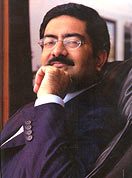The next decade is for India to grab
04 November, 2009 | Moneycontrol.com
ShareMr. Kumar Mangalam Birla, Chairman, Aditya Birla Group
Published on Wednesday, 4 November 2009
u;pdated on Thursday, 5 November 2009
Source: Moneycontrol.com/p>
In the ten years that he has been at the helm of the USD 29.2 billion MNC, Birla has won recognition for his contribution to industry and to professionalising management. He believes that the current generation is a fearless one that will shape the next few decades for us.
 A decade is but a small speck on the sands of civilisation’s time. But in the life of a nation born only sixty two years ago, a decade can be quite transformational. Each of the last two decades has been transformational for India, and the next one will also see dramatic changes.
A decade is but a small speck on the sands of civilisation’s time. But in the life of a nation born only sixty two years ago, a decade can be quite transformational. Each of the last two decades has been transformational for India, and the next one will also see dramatic changes.
We will see substantial economic growth, reduction in poverty, higher degree of urbanisation and a virtual explosion of talent. These changes will be visible not just in living standards or aspirations of the people, but also in public policy. Future leaders will be from a generation born in the era of economic reforms. These leaders are unfamiliar with shortages, and the days of licence and permits. This is the fearless generation that will shape the next few decades for us.
Setting the context
The global economic turmoil has severely tested every country. India has weathered the crisis extremely well and has emerged stronger, relative to other countries. India’s economic resilience and policy responses are positive indicators that the country’s stature in the international order will gain significantly in the coming decade. Given that an economy’s performance is perhaps the major factor determining a country’s leadership role in the global order, the relatively strong economic performance is likely to confer for India a larger global political role also.
Global leadership
I envision India’s higher international leadership along several dimensions. First, India will be, along with China and Brazil, among the worlds’ major drivers of economic growth. It is feasible that a 7-8 per cent p.a. GDP growth over the coming decade will significantly narrow the differential in income and living standards between India and some of the emerging Asian countries.
The growth impetus provided by the domestic economy can easily propel us into the world league. We can become one of the manufacturing hubs for the world, in areas like automotive, metals, textiles and engineering. In IT services we can enhance our already established global status.
Power to influence
India’s leadership role will gain on other fronts too. The country’s economic strength, democratic underpinnings and credibility in a troubled neighbourhood will increase India’s role as a regional mediator and as a key player in ensuring South Asia’s stability.
At another level, multilateral institutions such as the World Bank and IMF will perforce have to recognise the reality of the importance of the new global economic powerhouses and will have to accord those countries a larger role and voice those institutions.
Likewise, I do see India getting due representation in an expanded UN Security Council. And importantly, India will, over the next decade, extend its influence to the wider South East Asian region as a full-fledged member of the ASEAN economic bloc.
Key drivers
Let me identify the key factors that will drive India’s higher global ranking, economically and in terms being able to project its influence. First, I am confident that our Government will continue on the path of pragmatic liberalisation, combined with improved fiscal discipline and monetary prudence. The fiscal position will improve driven by combination of higher growth leading to tax buoyancy, a rationalised tax structure leading to better compliance, and more decisive and broader push on the disinvestment front. Hopefully, the sounder fiscal position should lead to globally competitive interest rates.
Second, I think the reduced involvement in running businesses will enable the Government to free resources and focus more sharply on those areas where it has to take the lead. Such as building the country’s lagging physical and social infrastructure. Providing a wide range of critical social goods, among them education, health care, drinking water, sanitation, law and order and also providing an economic safety net to those who are inevitably affected and disrupted by change.
 A third decisive trend that will play out over the next decade will be a significant strengthening and globalisation of India’s corporate sector. Although this is a process that has been on for almost two decades now, we still have a lot of ground to cover. The reinforcing of corporate sector will be evident in areas such as stronger balance sheets, larger scale of operations, focused business portfolios, the emergence of global Indian brands, heightened global M&;A activity, stronger corporate governance and greater engagement with society. Be it by way of higher standards of environmental compliance or taking on a larger role in the development of communities around them.
A third decisive trend that will play out over the next decade will be a significant strengthening and globalisation of India’s corporate sector. Although this is a process that has been on for almost two decades now, we still have a lot of ground to cover. The reinforcing of corporate sector will be evident in areas such as stronger balance sheets, larger scale of operations, focused business portfolios, the emergence of global Indian brands, heightened global M&;A activity, stronger corporate governance and greater engagement with society. Be it by way of higher standards of environmental compliance or taking on a larger role in the development of communities around them.
Aspirational benchmark
There are other aspirational benchmarks that we ought to achieve by the end of the decade. For example, in education we need to aim for 100 percent enrolment for all children in primary schools. We need a higher enrolment in colleges too. All our major universities need strengthening, and I see that a pragmatic mix of public and private involvement can help achieve that. Just as we have a ten year target for a moon mission, or nuclear power, we can have similar ambition for Olympic medals and Nobel winners. In the world of business, I see that we can have several Indian companies that can be counted in the top fifty of Fortune 500.
Raring to go
I do believe that India is set for rapid growth and progress over the next decade. Even so, I believe that we have to scale up the boldness of our dreams. The time has come to shift from small, incremental moves to taking big leaps even if it means taking on greater risks.
As the world economy slowly takes to the upswing, we must be ahead of the curve in terms of growth and value creation, so that we are able to supplement the domestic growth momentum with the global push, when it come. High economic growth is a prerequisite to achieve inclusive growth. The next decade is for India to grab.






